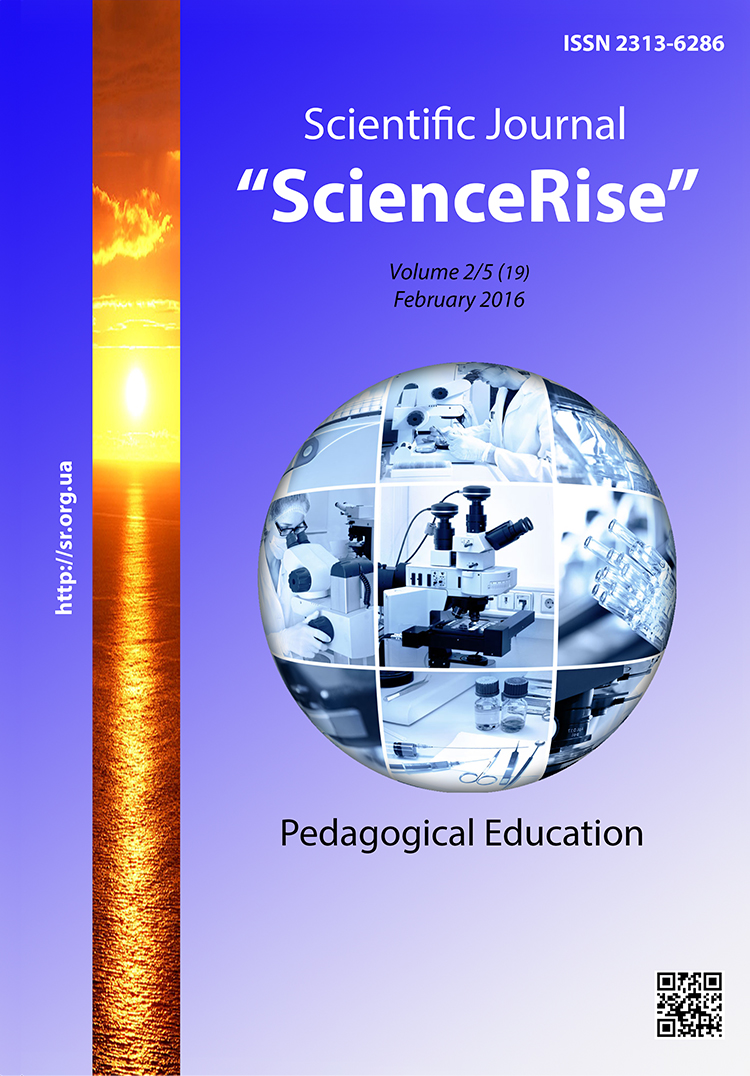The specific impact of musical performing activity on formation of professional-value orientations of the students of musical specialities
DOI:
https://doi.org/10.15587/2313-8416.2016.61042Keywords:
musical performing activity, professional-value orientations, students of musical specialtiesAbstract
The problem of orientation of students-musicians on the values of professional activity was always in the center of attention of scientists. It is well-known that music plays the specific role in the life activity of individual because of its ability to deep impact on the spiritual world of the person. Analyzing the value orientations of the person in the field of musical performing it is worth to notice that the system of musical value orientations of the youth is formed in the process of musical activity: perception, musical performing, creation, and educational activity.
In the article were considered the possibilities of impact of musical performing activity on formation of the professional-value orientations of the future teachers-musicians. There was carried out an analysis of theoretical statements of the famous scientists and art historians about the essence of musical performing and the regularities of its impact on person. Musical performing activity is considered as a peculiar artistic, esthetic value. In the product of such activity in specific form is fixed the complicate process of creating something new that is creation itself. In its turn the low level of musical education has the negative impact on consciousness of consumers of such art especially those who at this time have not the stable system of art values. Taking into account that the values of musical performing are one of the components of the structure of professional-value orientations of the future teachers-musicians the solution of this problem is possible at the expense of: use in this process the best examples of the different types and styles of international and national musical art, the permanent improvement of musical performing mastery and interpretation of compositions and also including the future specialists to the concert practice
References
Losev, I. V. (1995). Istoriya i teoriya svitovoy kultury. Evropeyskiy kontekst [History and theory of world culture. The European context]. Kyiv: Libid’, 224.
Sohor, A. N. (1980). Voprosy sociologyi i estetiki musiki. Chep. 1 [Issues of sociology and aesthetics of music. Chep. 1]. Leningrad: Soviet Composer, 295.
Nazaykinskiy, Y. V. (2003). Stil I zhanr v musike [Style and genre in music]. Moscow: VLADOS, 248.
Cherednichenko, T. V. (1988). Sovremennaya estetika musikalnogo iskusstva [The modern aesthetics of musical art]. Moscow: Soviet Composer, 320.
Lee, C. (2012). Structure of Foreign Musical Students Professional and Value Orientation. European Researcher, 37 (12), 2231–2238.
Kagan, M. S. (1974). Chelovecheskaya deyatelnost’ [Human activity]. Moscow: Politizdat, 328.
Zakharov, V. K.; Myronjuk, O. G., Glushych, O. D. et. al (1997). Shlyahi ekonovichnogo vyhovannya specialistiv u cilisnomu procesi ih pidgotovky u vuzi kultury [The economic education specialists in the holistic process of their preparation in the University culture]. Questions Of Cultural Studies, 15, 50–58.
Grigoriev, V. (1991). Nekotorie cherty pedagogicheskoy sistemy D. Oystraha [Some features of the pedagogical system of D. Oistrakh]. Music Performance and Pedagogy. Moscow: Musica, 5–35.
Erjemsky, G. L. (1993). Zakonomernosti i paradoksy dirizhirovaniya [The patterns and paradoxes of conducting]. Sankt-Peterburg: Dean, 263.
Kogan, G. M. (1977). U vrat masterstva [At the gate of mastery]. Moscow: Soviet Composer, 176.
Mozgalyova, N. G. (2003). Do pytannya pro motivaciu muzichnogo mislennya maybutnih uchiteliv muziki [To the question about the motivation of musical thinking of the future teachers of music]. Creative personality of the teacher: problems of theory and practice, 10, 196–201.
Cagarelli, U. A. (1989). Psihologiya musikalno-ispolnitelskoy deyatelnosti [Psychology of musical performance]. Leningrad, 31.
Davidov, N. A. (2000). Do slovnyka muzichnoyi pedagogiki [In the dictionary of music education]. Music Art, 14, 144–155.
Korredor, H. M. (1960). Besedy s Pablo Kalzasom [Conversations with Pablo Casals]. Leningrad: Music, 105–258.
Downloads
Published
Issue
Section
License
Copyright (c) 2016 Олександр Сергійович Плохотнюк

This work is licensed under a Creative Commons Attribution 4.0 International License.
Our journal abides by the Creative Commons CC BY copyright rights and permissions for open access journals.
Authors, who are published in this journal, agree to the following conditions:
1. The authors reserve the right to authorship of the work and pass the first publication right of this work to the journal under the terms of a Creative Commons CC BY, which allows others to freely distribute the published research with the obligatory reference to the authors of the original work and the first publication of the work in this journal.
2. The authors have the right to conclude separate supplement agreements that relate to non-exclusive work distribution in the form in which it has been published by the journal (for example, to upload the work to the online storage of the journal or publish it as part of a monograph), provided that the reference to the first publication of the work in this journal is included.

